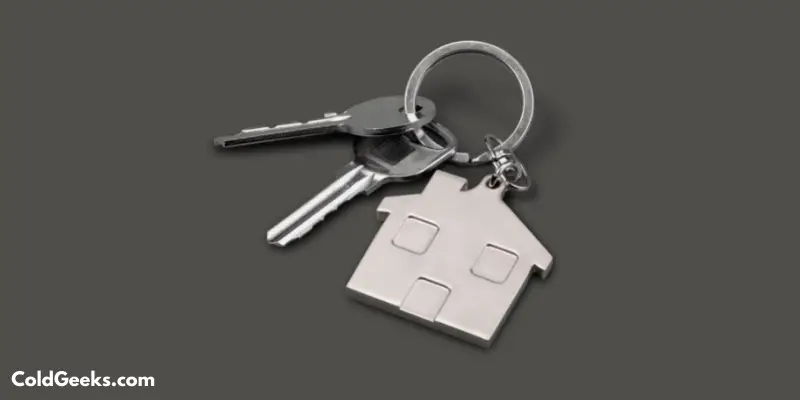If you use magnets with your keys, a magnetic key box, or magnetic keys, you might be wondering if they work in cold weather.
Are keys magnetic in cold weather?
Keys retain their magnetic properties in cold weather. Steel and iron keys are magnetic in cold weather. Most house and car keys are not magnetic. Keys that are not magnetic do not become magnetic in cold weather. Magnetic keys, key chains, and magnetic key boxes work in cold weather.
In this article, you’ll learn everything you need to know about, “Are keys magnetic in cold weather.”
Are Keys Magnetic in Cold Weather? (Answered with Science)

The answer is “yes,” certain keys are magnetic in cold weather.
Keys made of steel, iron, nickel, or another type of ferromagnetic metal are magnetic. Keys made of a mixture of ferromagnetic and nonferromagnetic substances are much less magnetic or not magnetic at all.
Ferromagnetic metals are those that are attracted to magnets. These metals are made up of billions of tiny magnetic particles, known as atoms.
When the atoms line up in the same direction, they create a strong magnetic field.
While ferromagnetic metals are attracted to magnets, they can also be magnetized themselves. This occurs when the magnetic particles within the metal line up in the same direction.
This can be done using an electric current or by placing the metal in a strong magnetic field.
Once magnetized, these metals will remain magnetized until they are exposed to an opposing magnetic field. Ferromagnetic metals are an important part of our world, and their unique properties make them ideal for a variety of applications.
Ferrimagnetic materials are similar but contain at least two different types of atoms that are magnetic.
The smaller atom creates a magnetic connection in the same direction as the larger one, while the larger one creates a magnetic connection in the opposite direction.
This results in overall lower magnetization
At room temperature, keys made of ferromagnetic metals are magnetic.
However, the strength of a magnetic field increases slightly as the temperature decreases. At very low temperatures, the magnetization of your keys is still strong.
That is, down to around -185 degrees Celsius (-301 degrees Fahrenheit).
At that point, the magnetization starts to break down.
This means that certain keys and other magnetic objects will work just as well in most cold weather as they do in warmer weather. If you’re ever stuck outside in the cold and need to use a key, don’t worry—your keys will still be magnetized.
Here is a good video about how cold weather affects magnets:
What Keys are Magnetic in Cold Weather?
Not all keys are magnetic in cold weather.
If a key is not magnetic at room temperature, it will not magically become magnetized in colder climates.
Let’s look at a few specific types of keys to see if they are magnetic at lower temperatures.
Are House Keys Magnetic in Cold Weather?
In the dead of winter, there’s nothing worse than fumbling with a frozen key at your front door.
But have you ever noticed that your house keys seem to be more magnetic in cold weather? It’s a common question, and unfortunately, the answer is not as straightforward as you might think.
House keys are generally made with a mix of magnetic and nonmagnetic materials.
The composition of the key will vary depending on the manufacturer, but typically, the nonmagnetic portion is made of brass or nickel. The magnetic portion is usually steel.
As a result, most house keys are not very magnetic in warm or cold weather.
However, there are a few factors that can influence the magnetism of your keys. For example, if your key is made entirely of steel, it will be more likely to stick to a magnet.
Also, many old keys (sometimes known as “Skeleton Keys”) are made of iron.
Are Car Keys Magnetic in Cold Weather?
If you’ve ever tried to stick your car key to a magnet, you may have been disappointed to find that it doesn’t work very well.
In fact, most modern car keys are only weakly magnetic.
There are a few exceptions, however. Some keys are made of ferrous metals like iron or steel, and these will be attracted to a magnet. However, most keys are partially made of non-ferrous metals like nickel or copper, which are not especially attracted to magnets.
Are Steel Keys Magnetic in Cold Weather?
Steel keys are made of iron, which is a naturally magnetic material.
However, the key itself is usually not highly magnetic. This is because the key has been tempered, or heat-treated, to make it harder and less brittle.
The tempering process disrupts the natural alignment of the iron atoms, which diminishes the metal’s ability to magnetize.
Cold weather can also affect a key’s magnetism. Iron becomes more magnetic as its temperature decreases, so a cold steel key may be slightly more attracted to a magnet than a warm one.
However, the difference is usually too small to be noticeable.
Smaller steel keys, such as mailbox keys, are usually magnetic.
Are Bronze Keys Magnetic in Cold Weather?
While it’s true that bronze is not magnetic, the alloy that is used to make keys can be affected by changes in temperature.
In general, keys made from brass or bronze will become somewhat more magnetic in cold weather.
This is because the metal molecules contract when exposed to cold temperatures, making it easier for the atoms to line up in a magnetic field.
However, this effect is usually temporary, insignificant, and disappears as the key warms up to room temperature.
Are Silver Keys Magnetic in Cold Weather?
Wondering if silver keys are magnetic in cold weather? The answer is no, silver is not magnetic.
However, at lower temperatures, silver does gain an insignificant degree of magnetism. If you mix silver with iron, you can make it more magnetizable.
Do Magnetic Keys Work in Cold Weather?
A magnetic key is a device that uses magnets to open and close a lock.
Magnetic keys are often used in lieu of traditional metal keys, and they have a number of advantages. For one, they are much more difficult to copy than traditional keys.
In addition, magnetic keys are not susceptible to wear and tear in the way that metal keys are.
However, some people have wondered whether or not magnetic keys work as well in cold weather as they do in warm weather.
The short answer is yes, magnetic keys do work in cold weather.
In fact, they may work even better in colder climates than in hotter climates. This is because low temperatures typically make a magnet stronger, not weaker.
Can You Store Spare Keys in a Magnetic Box Under Your Car in Cold Weather?
The other day I was talking to a friend of mine who is also a winter weather enthusiast.
We were discussing different tips and tricks for driving in the snow and I mentioned that I sometimes store spare keys in a magnetic box under my car. He was surprised to hear this because he thought that you should never store spare keys in a magnetic box under your car because the cold weather will cause the magnet to lose its strength and the keys will fall off.
But this is only true of extremely cold temperatures.
Unless you are driving through the center of an iceberg in Antarctica, the magnet will actually work better in cold weather than it does in warm weather.
5 Tips for Keeping Your Magnetic Keys from Freezing in Cold Weather
While magnets might work better in cold weather, frozen magnetic keys can be no fun at all.
Here are five quick tips for keeping your magnetic keys from freezing in cold weather.
Keep your magnetic keys warmer by:
- Keep your keys in your pocket: If you keep your keys in your pocket, they will stay warmer and less likely to freeze. You can also put your keys in your bra.
- Put your keys in a sealable bag: Putting your keys in a sealable bag will help to keep them dry and prevent moisture from condensing on them.
- Use hand warmers: Hand warmers can help to keep your keys warm, just be sure not to put them directly against your skin.
- Use a key cover: A key cover or key fob can help to insulate your keys and keep them warm.
- Invest in a quality key: A key made of durable materials is less likely to break or freeze in cold weather.
Final Thoughts: Are Keys Magnetic in Cold Weather?
The bottom line is that magnetic keys are more magnetic in cold weather.
Nonmagnetic keys will also be nonmagnetic in lower temperatures and chillier climates.
Related posts:
- Is PEX Good for Cold Weather? (Solved & Explained)
- Is Dri Fit Good for Cold Weather? (Tested & Solved)
- Grease and Cold Weather: 11 Answers You Need To Know
- Why Does Silver Melt Ice? (Everything You Need To Know)

